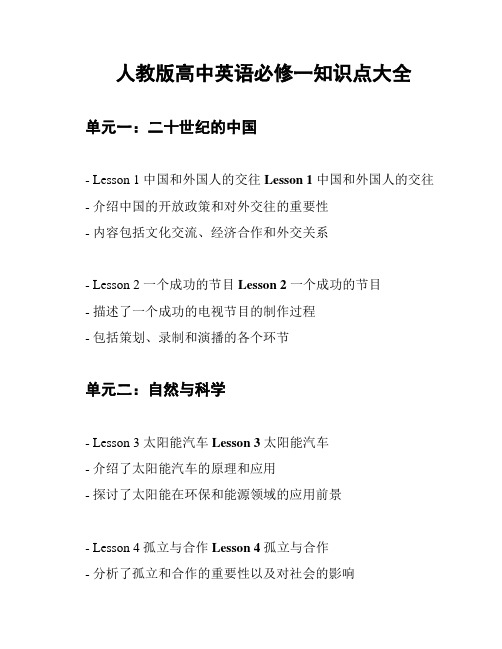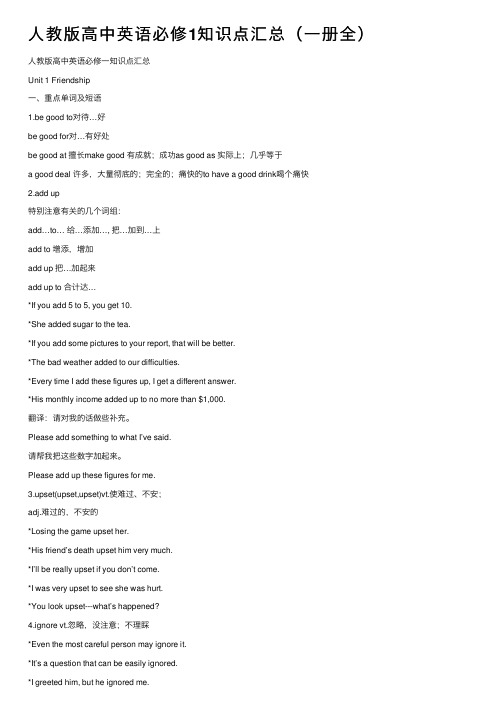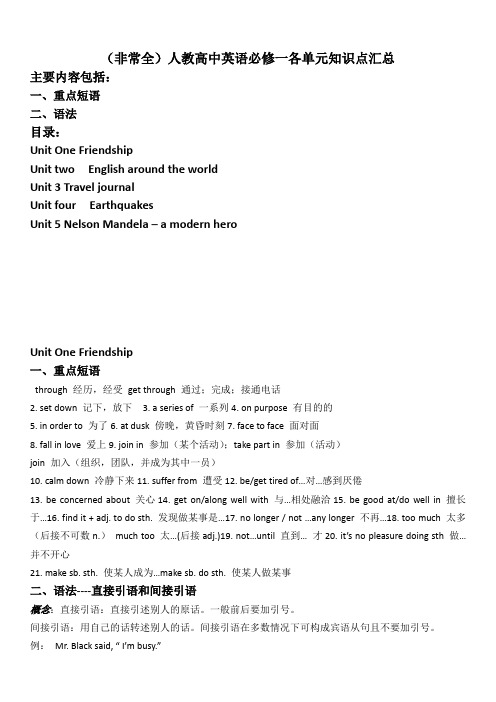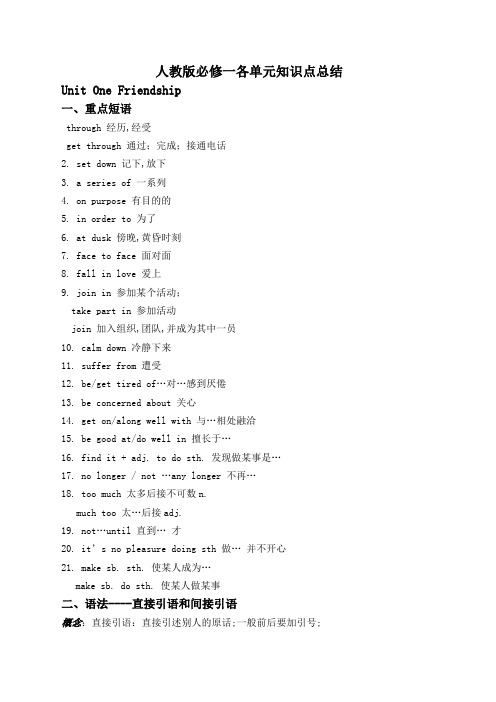人教版高中英语必修一知识点复习提纲
人教版高中英语必修一知识点大全

人教版高中英语必修一知识点大全单元一:二十世纪的中国- Lesson 1 中国和外国人的交往Lesson 1中国和外国人的交往- 介绍中国的开放政策和对外交往的重要性- 内容包括文化交流、经济合作和外交关系- Lesson 2 一个成功的节目Lesson 2一个成功的节目- 描述了一个成功的电视节目的制作过程- 包括策划、录制和演播的各个环节单元二:自然与科学- Lesson 3 太阳能汽车Lesson 3太阳能汽车- 介绍了太阳能汽车的原理和应用- 探讨了太阳能在环保和能源领域的应用前景- Lesson 4 孤立与合作Lesson 4孤立与合作- 分析了孤立和合作的重要性以及对社会的影响- 举例说明了合作在科学研究和国际合作中的作用单元三:身心健康- Lesson 5 关于睡眠的调查Lesson 5关于睡眠的调查- 描述了一项关于睡眠惯的调查结果- 分析了睡眠对身心健康的重要性并提出相关建议- Lesson 6 过度分析带来的压力Lesson 6过度分析带来的压力- 探讨了过度分析和压力之间的关系- 提供了减轻压力的方法和建议单元四:青少年与休闲- Lesson 7 网络休闲与现实沟通Lesson 7网络休闲与现实沟通- 分析了网络休闲和现实沟通的特点及其影响- 强调了健康使用网络的重要性和培养现实沟通能力的必要性- Lesson 8 如何选择适合的休闲方式Lesson 8如何选择适合的休闲方式- 提供了选择适合的休闲方式的建议- 强调了均衡安排研究和休闲的重要性单元五:传统文化- Lesson 9 传统节日的起源与庆祝方式Lesson 9传统节日的起源与庆祝方式- 介绍了一些中国传统节日的起源和庆祝方式- 分析了传统节日对文化传承的意义- Lesson 10 文化输出与文化遗存Lesson 10文化输出与文化遗存- 分析了文化输出和文化遗存的概念和影响- 讨论了文化保护和传播的重要性单元六:生活与研究- Lesson 11 如何研究高效Lesson 11如何学习高效- 提供了高效研究的方法和技巧- 强调了良好的研究惯和时间管理的重要性- Lesson 12 大学生活和社会责任Lesson 12大学生活和社会责任- 探讨了大学生活和社会责任的关系- 提出了大学生应该承担的社会责任以上是人教版高中英语必修一的知识点大全。
人教版高中英语必修1知识点汇总(一册全)

⼈教版⾼中英语必修1知识点汇总(⼀册全)⼈教版⾼中英语必修⼀知识点汇总Unit 1 Friendship⼀、重点单词及短语1.be good to对待…好be good for对…有好处be good at 擅长make good 有成就;成功as good as 实际上;⼏乎等于a good deal 许多,⼤量彻底的;完全的;痛快的to have a good drink喝个痛快2.add up特别注意有关的⼏个词组:add…to… 给…添加…, 把…加到…上add to 增添,增加add up 把…加起来add up to 合计达…*If you add 5 to 5, you get 10.*She added sugar to the tea.*If you add some pictures to your report, that will be better.*The bad weather added to our difficulties.*Every time I add these figures up, I get a different answer.*His monthly income added up to no more than $1,000.翻译:请对我的话做些补充。
Please add something to what I’ve said.请帮我把这些数字加起来。
Please add up these figures for me.3.upset(upset,upset)vt.使难过、不安;adj.难过的,不安的*Losing the game upset her.*His friend’s death upset him very much.*I’ll be really upset if you don’t come.*I was very upset to see she was hurt.*You look upset---what’s happened?4.ignore vt.忽略,没注意;不理睬*Even the most careful person may ignore it.*It’s a question that can be easily ignored.*I greeted him, but he ignored me.5.calm adj.平静的,镇静的;风平浪静的vt.使平静*After the storm, the sea was calm again.*Keep calm in time of danger.*Don’t be nervous; calm yourself, please.calm down平静下来*I told him to calm down.6.concern vt.关系到,和…有关;使关⼼*This matter concerns all of us.*I’m not concerned with this matter again.be concerned about关⼼…;为…担⼼*Please don’t be concerned about me.7.go through 经历,经受;审阅,检查*Most families went through a lot during the war. *I can’t go through these letters in an hour.8. “make her diary her best friend”“call my friend Kitty”make和call都能以名词作宾语补⾜语,即make+sb./sth.+n. 使某⼈/某物成为…call+sb./sth.+n. 称某⼈/某物为…*We must try to make our country a strong one.*All work and no play makes Jack a dull boy.*We called messenger msn in short.*What do you call it?9.everything to do with naturesomething/anything/everything/nothing to do with 与…有关/⽆关*What he is doing has nothing to do with his work.10.far too much实在太多too much(+n.)太多(…), 超过某⼈的能⼒far/much too+adj./adv.实在太…too much homeworkThe work is too much for a boy like him.It’s (much/far) too hot todaymuch/ far too much实在太多11.suffer vi.受苦,受痛苦,受损失vt.受到,遭受*He suffered terribly when his mother died.*He looked pale, and seemed to have suffered a lot/a great deal. *We suffered a set-back/no pain. suffer from遭受,患(病)*I suffered much from lack of rest.suffer from cold/cancer12.recover vt.恢复vi.痊愈*She recovered her health.*Amy is recovering from a severe illness.*He is unlikely to recover.13.get tired of对…开始感到厌烦(表动作)be tired of对…感到厌烦(表状态)14.get along with和…相处;进展*They get along quite well with each other.*How are you getting along with your classmates?*How are you getting along with your English?*I’m getting along well with my study.15.exactly adv.确切地;正是;说的对*You must tell me exactly what you’re doing?*That’s exactly what I want.*It looks exactly like an elephant’s leg.*Exactly!(=That’s right.)16.grateful adj.感激的*I’m very grateful to you for your advice.=Thank you very much for your advice.17.joinA.参加,加⼊(成为其中的成员)*He joined the army/the Party 3 years ago.*He is too young to join the club.B.join sb.和某⼈⼀起(从事某活动)*Will you join us for dinner?*I’ll join you later.*May I join you in the game?C.join in参加某活动(=take part in)*A lot of newcomers joined in the discussion.*May I join in the game?⼆、重点句型1. Do you want a friend whom you could tell everything to, like your deepest feelings and thoughts?2. I wonder if it’s because I haven’t been able to be outdoors for so long that I’ve grown so crazy about everything to do with nature.3. I can well remember that there was a time when a deep blue sky, the song of the birds, moonlight and flowers could never have kept me spellbound.4. It’s no pleasure looking through these any longer because nature is one thing that really must be experienced.5. It/This/That is the first /second…time that+现在完成时“某⼈第⼀/⼆次做……”eg. It is the first time that I have been to the airport.It/This/That was the first / second…timethat+过去完成时eg. It was the second time that I had seen him.三、语法语法----直接引语和间接引语概念:直接引语:直接引述别⼈的原话。
人教版高中英语必修一知识点总结免费

人教版高中英语必修一知识点总结免费人教版高中英语必修一知识点总结免费对于刚刚升入高中的高一学子来说,每一个科目的学习都是一项挑战。
那么关于高中必修一的英语知识点都有哪些呢?以下是小编准备的一些人教版高中英语必修一知识点总结,仅供参考。
高中英语必修一知识点总结:Unit11.词组:add up add up to add…to…add tocalm… downhave got tobe concerned about/withwalk the dogcheat…ofgo through go ahead go byset down set up set off set outa series ofon purpose by accident/chancein order to so as to in order that so as thatat dusk at dawn at midnight at noonface to faceno longer not…any longersettle downsuffer fromrecover fromget/be tired ofmake a list of listpack…upget along/on withfall in lovebe grateful to sb.for sth.join in take part in join attendmake sb/sth+宾语补足语have something/anything/everything/nothing to do withit’s because…..+原因it’s why….+结果dare+(to)do(实义动词)do(情态动词)a year and a halfit’s no pleasure+doing sthhappen to do sthhave trouble with sb(in)doing sthexactlyfind it+adj.+to do sthmake friends withswap…withit is/was+序数词+that+has done/ha d done….高一英语阅读理解答题技巧1.首先解题时要充满自信。
高中英语必修一知识点复习归纳考点

高中英语必修一知识点复习归纳考点Introduction高中英语必修一是普通高中英语学科的起点,作为学科的入门课程,必修一主要是为学生打好英语基础,包括基本的语音、语法、词汇以及阅读理解等方面的内容。
知识点的复习归纳是对于这门学科的一种必备的复习方法,从而帮助学生更好地掌握所学知识并能够高效地进行备考。
Part One: 语音语音作为语言的基础,对于英语学习者来说也是非常重要的一个方面。
在高中英语必修一的课程中,语音主要包括音标和发音的相关内容。
音标的学习是语音基础的一部分,英语中常用的有国际音标和注音符号两种,其中国际音标更常用。
在复习过程中,可以先把各个音标的名称和发音规则掌握,再结合实际情况进行练习。
发音的学习则需要通过大量的模仿和练习来提高。
英语中有很多发音都和汉语不同,尤其是元音和辅音的发音,需要同学们多多练习。
Part Two: 语法语法是测试学生英语能力的一个重要方面,也是英语中最基本的部分之一。
在高中英语必修一中,主要包括基本的句子结构和动词时态。
句子结构是指由主语、谓语、宾语等各个成分构成的句子的结构。
在复习时,需要了解各个成分的语法功能,同时也需要掌握如何运用各种成分来构建不同的句子结构。
动词时态是指动词所表示的时间状态,包括现在时、过去时、将来时等。
在复习时,需要掌握各种时态的构成和使用规则。
Part Three: 词汇词汇是英语学习的基础,掌握足够的词汇量可以提高我们的阅读和作文能力。
在高中英语必修一中,需要掌握的主要是一些基础的单词和常用短语。
在复习时,可以通过背单词或者阅读文章来扩充自己的词汇量,同时也需要掌握一些语境下的搭配和使用方法。
Part Four: 阅读理解阅读理解是听说读写中的一个方面,它需要学生具备对英语文本的理解能力。
在高中英语必修一中,阅读理解主要包括文本的理解和难点词语的理解。
在复习阅读理解时,需要注意文本的大意和细节,掌握文本中的重点句子和段落,并能够准确地理解难点词语的含义。
人教高中英语必修一 复习资料(共89张PPT)

prefer flow determine
organize
bend boil
preferred-preferred flowed-flowed adj. determined determination adj. organized n. organization bent-bent boiling boiled
必修1各单元复习
Unit 1
spelling 动词注意时态,名词注意单复 数,还须注意词性
心烦意乱的 不理睬,忽视 关心,挂念 完全地 安家,定居,解决 遭受 痊愈 确实如此,正是 一系列 青少年 在户外,在野外adv.
upset ignore be concerned about entirely settle suffer recover exactly a series of teenager outdoors
prefer 用 法
在大学毕业之后
穿着羊毛衣服的孩子们 景色辨析
fun
prefer sth to sth doing to doing to do rather than do
after graduation after graduating from college
children dressed in long wool coats
there is no such thing as
play an important part in
recognize sb/sth be recognized as被公认 为
Unit 3
Spelling 动词注意时态,名词注意单复 数,还须注意词性
人教高中英语必修一各单元知识点汇总

(非常全)人教高中英语必修一各单元知识点汇总主要内容包括:一、重点短语二、语法目录:Unit One FriendshipUnit two English around the worldUnit 3 Travel journalUnit four EarthquakesUnit 5 Nelson Mandela – a modern heroUnit One Friendship一、重点短语through 经历,经受get through 通过;完成;接通电话2. set down 记下,放下3. a series of 一系列4. on purpose 有目的的5. in order to 为了6. at dusk 傍晚,黄昏时刻7. face to face 面对面8. fall in love 爱上9. join in 参加(某个活动);take part in 参加(活动)join 加入(组织,团队,并成为其中一员)10. calm down 冷静下来11. suffer from 遭受12. be/get tired of…对…感到厌倦13. be concerned about 关心14. get on/along well with 与…相处融洽15. be good at/do well in 擅长于…16. find it + adj. to do sth. 发现做某事是…17. no longer / not …any longer 不再…18. too much 太多(后接不可数n.)much too 太…(后接adj.)19. not…until 直到…才20. it’s no pleasure doing sth 做…并不开心21. make sb. sth. 使某人成为…make sb. do sth. 使某人做某事二、语法----直接引语和间接引语概念:直接引语:直接引述别人的原话。
高中英语必修一重点短语语法知识点总结

人教版必修一各单元知识点总结Unit One Friendship一、重点短语through 经历,经受get through 通过;完成;接通电话2. set down 记下,放下3. a series of 一系列4. on purpose 有目的的5. in order to 为了6. at dusk 傍晚,黄昏时刻7. face to face 面对面8. fall in love 爱上9. join in 参加某个活动;take part in 参加活动join 加入组织,团队,并成为其中一员10. calm down 冷静下来11. suffer from 遭受12. be/get tired of…对…感到厌倦13. be concerned about 关心14. get on/along well with 与…相处融洽15. be good at/do well in 擅长于…16. find it + adj. to do sth. 发现做某事是…17. no longer / not …any longer 不再…18. too much 太多后接不可数n.much too 太…后接adj.19. not…until 直到…才20. it’s no pleasure doing sth 做…并不开心21. make sb. sth. 使某人成为…make sb. do sth. 使某人做某事二、语法----直接引语和间接引语概念:直接引语:直接引述别人的原话;一般前后要加引号;间接引语:用自己的话转述别人的话;间接引语在多数情况下可构成宾语从句且不要加引号;例: Mr. Black said, “ I’m busy.”Mr. Black said that he was busy.变化规则一陈述句的变化规则直接引语如果是陈述句,变为间接引语时,用连词that可省略引导,从句中的人称、时态、指示代词、时间状语、地点状语都要发生相应的变化;人称的变化——人称的变化主要是要理解句子的意思例:1. He said, “I like it very much.”→ He said that he liked it very much.2. He said to me, “I’v left my book in your room.”→ He told me that he had left his book in my room.时态的变化例:“I don’t want to set down a series of facts in a diary,” said Anne.→Anne said that she didn’t want to set down a series of facts in a diary. The boy said, “I’m using a knife.”→ The boy said that he was using a knife.▲注意:如果直接引语是客观真理,变为间接引语时,时态不变,如:He said, “Light travels much faster than sound.”He said that light travels much faster than sound.指示代词、时间状语、地点状语和动词的变化二祈使句的变化规则如果直接引语是祈使句,变为间接引语时,要将祈使句的动词原形变为带to的不定式,并根据句子意思在不定式前加上tell/ask/order等动词,如果祈使句是否定句,在不定式前面还要加上not;例:The hostess said to us, “Please sit down.”→ The hostess asked us to sit down.He said, “Don’t make so much noise, boys.”→ He told the boys not to make so much noise.三疑问句的变化规则如果直接引语是疑问句,变为间接引语时要把疑问句语序变为陈述句语序,句末用句号;一般疑问句:如果直接引语是一般疑问句,变为间接引语时,谓语动词是say或said时,要改为 ask 或asked,原问句变为由if/whether 引导的宾语从句;例:“Do you think a diary can become your friend ” the writer says.→ The writer asks us if we think a diary can become our friend.2 特殊疑问句:如果间接引语是特殊疑问句,变为间接引语时,仍用原来的引导词,但疑问句要变为陈述句;例:“What do you want ” he asked me.→ He asked me what I wantedUnit two English around the world一、重点短语1. be different from 与…不同be the same as 与…一样2. one another 相互,彼此=each other3. official language 官方语言4. at the end of 在…结束时5. because of 因为后接名词或名词性短语because 因为后接句子6. native speakers 说母语的人7. be based on 根据,依据8. at present 目前;当今9. especially 特别,尤其specially 专门地10. make use of 利用…make the best of 充分利用…11. a large number of 大量的,很多作主语,谓语动词用复数the number of …的数量作主语,谓语动词用单数12. in fact = actually= as a matter of fact 事实上13. believe it or not 信不信由你14. there is no such thing as…没有这样的事…15. be expected to …被期待做某事16. play a part/role in …在…起作用17. make lists of…列清单18. included 包括前面接包括的对象Including包括后接包括的对象19. command sb. to do sth. 命令某人去做某事command + that 从句从句用should+V原20. request sb. to do sth. 要求某人做某事request + that 从句从句用should+V原二、语法----英语中的命令command语气和请求request语气命令语气:表示直接命令某人做某事,语气比较重,不怎么礼貌,一般用于上级对下级例:1. “ Look at the example”, the teacher said to us.2. Open the window请求语气:表示请求某人做某事,语气比较缓和,非常礼貌例:1. “ Would you like to see my flat ” She asked.2. Would you please open the windowUnit 3 Travel journal一、重点短语1. travel----泛指旅行journey----指长时间长距离的陆上旅行voyage----指长距离的水上旅行,也可以指乘飞机旅行trip----常指短时间短距离的旅行tour----指周游,巡回旅游,2. prefer to 更加喜欢,宁愿prefer A to B 比起B,更喜欢Aprefer doing to doing 比起做…,宁愿做…prefer to do rather than do 与其做…, 不如…3. flow through 流过,流经4. ever since 自从5. persuade sb. to do sth. 说服某人做某事6. be fond of 喜欢7. insist on doing 坚持做某事insist + that 从句用should+ V原8. care about 关心9. change one’s mind 改变想法10. altitude 高度attitude 态度,看法11. make up one’s mind to do下定决心做某事= decide to do = make a decision to do12. give in 让步,屈服give up 放弃13. be surprised to …对…感到惊奇to one’s surprise 令某人惊讶的是…14. at last = finally = in the end 最终15. stop to do 停下来去做某事stop doing 停止做某事16. as usual 像往常一样17. so…that如此…以至于…So + adj + a/an + n. + thatSuch + a/an +adj. + n. + that18. be familiar with 对…熟悉人作主语be familiar to 为…所熟悉物作主语二、语法:现在进行时表将来现在进行时表将来,表示最近按计划或安排要进行的动作,常见的现在进行时表将来的动词有:come/ go / leave/ arrive / travel / take / stay/ do等.例:1. I’m coming. 我就来2. what are you doing next Sunday 你下个星期天做什么3. I hear that you are travelling along Mekong River. 我听说你将沿湄公河旅行4. Where are you staying at night 你们晚上待在哪里/Unit four Earthquakes一、重点短语1. right away 立刻,马上= at once = in no time2. asleep 睡着的;熟睡地fall asleep 入睡sleep 睡;睡眠sleepy 犯困的3. it seems that/ as if …看来好像…;似乎4. in ruins 成为废墟5. the number of …的数量谓语动词用单数a number of 大量谓语动词用复数6. rescue workers 营救人员Come to one’s rescue 营救某人7. be trapped 被困8. how long 多长时间how often 多久,指平率how soon 还要多久用于将来时当中,用in+时间段回答9. hundreds of thousands of 成千上万的10. dig out 挖出11. shake----泛指“动摇,震动”,常指左右、上下动摇,也可以指人“震惊,颤抖”例:1. She felt the earth shaking under him.2. She was shaken with anger.quake---- 指较强烈的震动,如地震例: The building quaked on its foundationTremble---- 指人由于寒冷、恐惧、不安等引起的身体的抖动或声音的颤抖例:Suddenly I saw her lips begin to tremble and tears begin to flow down her cheeks.Shiver---- 多指寒冷引起的颤抖、哆嗦例:A sudden gust of cold wind made me shiver.12. rise rose—risen---- vi, 上升;升起, 无被动语态;give rise to 引起Raiseraised—raised---- vt, 举起;筹集;养育Arise arose—arisen----vt, 出现常指问题或现象13. injure---- 常指因意外事故造成的损伤,也可以指感情上名誉上的伤害例:He was injured in a car accident.harm---- 泛指“伤害,损害”,既可以指有生命的,也可以指无生命的例:1. He was afraid that his fury would harm the child.2. His business was harmed for some reason.hurt---- 既可以指肉体上的伤害,也可以指精神上的伤害例:1. She hurt her leg when she fell.2. He felt hurt at your word.wound---- 一般指枪伤、刀伤等在战场上受的伤例:The bullet wounded him in the arm.14. be prepared for …= make preparations for…为…做准备15. in one’s honor 向…表示敬意;为纪念Be/ feel honored to do …做…感到很荣幸16. make /give/ deliver a speech 发言opening speech 开幕词17. give/ provide shelter to …向…提供庇护所seek shelter from…躲避18. happen to + n./ pron. 遭遇,发生happen to do sth. 偶然;碰巧happen ----指偶然发生take place----指事先计划好的事情发生二、语法----定语从句概念:在复合句中,修饰名词或代词的从句叫做定语从句;成分:先行词,即被定语从句修饰的名词或代词;关系代词:that,which,who宾格为whom,所有格为whose;或者关系副词where,when,why等;关系代词或关系副词处在先行词和定语从句之间,起着连接主从句的作用;1. 关系代词that的用法关系代词that在定语从句中既能指人,也能指物;既能做主语,也能做宾语例:1A plane is a machine that can fly. 指物,作主语2The noodles that I cooked were delicious. 指物,作宾语3Who is the man that is reading a book over there 指人,作主语4The girl that we saw yesterday was Jim’s sister,指人,作宾语2. 关系代词which的用法关系代词which在定语从句中只能指物,但既可以做宾语也能作主语例:1They planted some trees which didn’t need much water. 作主语2The fish which we bought this morning were not fresh. 作宾语3. 关系代词who,whom的用法关系代词who,whom 只能指人,在定语从句中分别作主语和宾语例:1The foreigner who helped us yesterday is from USA.作主语2The person to whom you just talked to is Mr. Li. 作宾语、4. 关系代词whose在的用法关系代词whose为关系代词who的所有格形式,其先行词既可以是人也可以是物,whose和它所修饰的名词在定语从句中既可以做主语也可以做宾语;例:1This is the scientist whose name is known all over the world. 指人,作主语2 The room whose window faces south is mine. 指物,作主语3He has written a book whose name I’ve forgotten. 指物,作宾语5. 关系副词when的用法关系副词when在定语从句中作时间状语例:1I’ll never forget the time when =during which we worked on the farm.2 Do you remember the afternoon when =on which we first met three yearsago6. 关系副词where在定语从句中的用法关系副词where在定语从句中做地点状语例:1This is the place where =at/ in which we first met.2 The hotel where = in which we stayed wasn’t very clean.7. 关系副词why在定语从句中的用法关系副词why在定语从句中作原因状语例: 1. I didn’t get a pay rise, but this wasn’t the reason why= for whichI left.2. The reason why =for which he has late was that he missed the train. Unit 5 Nelson Mandela – a modern hero一、重点词汇1. selfish 自私的selfless 无私的2. devote oneself to…致力于;献身于3. fight against 对抗,反对fight for 为…而战4. principle 原则principal 校长;主要的5. offer guidance to …给…提供指导6. out of work 失业7. join 加入组织,俱乐部,成为其中一员join in 参加活动take part in 参加活动8. as + adj +as one can 尽可能…= as + adj. +as possible9. as a matter of fact 事实上=in fact10. blow up 爆炸,炸掉11. set up 建立 ; set about 着手,开始做 set about doing sth. set off 出发,动身 ; set out 开始,出发set out to do sth.12. be sentenced to 被判…13. be equal to 与…相等;胜任14. be proud of 为…感到自豪15. give out 分发 give off 散发出气味16. die for 为…而死die of 死于自身原因,如疾病die from 死于外在原因,如车祸17. realize one’s dream of …实现..的梦想18. only 位于句首时,要主谓倒装例:Only then did we decide to answer violence with violence.Only in this way, can we protect the environment better. 二.语法----定语从句详见第四单元。
人教高中英语必修一各单元知识点汇总

人教高中英语必修一各单元知识点汇总Unit 1 Friendship1. Vocabulary: adjectives to describe people's characteristics (e.g. reliable, outgoing, generous, etc.)3. Reading: Understanding the main ideas and details in a reading passage, inferring the meaning of words from context4. Writing: Writing a letter of introduction, using appropriate greetings and closing statements5. Speaking: Discussing qualities of a good friend, expressing agreement or disagreement, expressing preferences Unit 2 English around the world1. Vocabulary: words related to language learning (e.g. fluent, bilingual, etc.), words related to education (e.g. curriculum, instruction, etc.)2. Grammar: Using "used to" to talk about past habits or states, using "would" to talk about past habits, using "will" and "would" to talk about future actions or intentions3. Reading: Understanding different types of texts (e.g. advertisements, news articles, etc.), inferring the purpose or tone of a text4. Writing: Writing an article about language learning, using appropriate structure and language5. Speaking: Discussing the importance of learning English, expressing opinions, giving reasons and examplesUnit 3 Travel journal1. Vocabulary: words related to travel and tourism (e.g. destination, ecotourism, etc.)2. Grammar: Using the present perfect tense to talk about experiences, using the present perfect continuous tense to talk about activities that started in the past and continue in the present3. Reading: Understanding a travel journal entry,identifying the main idea and supporting details4. Writing: Writing a travel journal entry, using appropriate descriptive language and organizing ideas chronologically5. Speaking: Discussing travel experiences, describing places visited, expressing preferences and opinionsUnit 4 Body language2. Grammar: Using the present continuous tense to talk about temporary actions or states, using the present simple tense to talk about general truths or habits3. Reading: Understanding an article about body language, understanding the purpose or main idea of a text4. Writing: Writing a dialogue about a misunderstanding due to body language, using appropriate dialogue format5. Speaking: Discussing cultural differences in body language, interpreting gestures and facial expressions, role-playing scenarios involving body language misunderstandings Unit 5 Nelson Mandela1. Vocabulary: words related to politics and human rights(e.g. apartheid, injustice, etc.)3. Reading: Understanding a biography of Nelson Mandela, identifying key events and milestones in his life4. Writing: Writing a biographical sketch about a famous person, using appropriate structure and language5. Speaking: Discussing the impact of Nelson Mandela's actions, expressing opinions on social justice issues, making connections between historical events and current events Unit 6 Inventors and inventions1. Vocabulary: words related to inventors and inventions(e.g. innovation, patent, etc.)2. Grammar: Using the present perfect tense to talk about achievements and discoveries, using the present perfect continuous tense to talk about actions or states that started in the past and continue in the present3. Reading: Understanding a passage about inventors and inventions, identifying the main idea and supporting details4. Writing: Writing a paragraph about a famous invention, using appropriate descriptive language and providing historical context5. Speaking: Discussing the significance of inventions, debating the ethics of scientific discoveries, predicting future inventionsUnit 7 Teenagers should be allowed to choose their ownclothes1. Vocabulary: words related to clothing and fashion (e.g. dress code, trend, etc.)2. Grammar: Using modal verbs to express possibility, permission, prohibition, etc., using conditional sentences to express hypothetical situations3. Reading: Understanding an argumentative essay on a controversial topic, identifying the author's stance and supporting reasons4. Writing: Writing an argumentative essay on a social issue, using appropriate persuasive language and organizing ideas effectively5. Speaking: Debating the pros and cons of a social issue, expressing opinions and supporting arguments, responding to counterarguments.。
- 1、下载文档前请自行甄别文档内容的完整性,平台不提供额外的编辑、内容补充、找答案等附加服务。
- 2、"仅部分预览"的文档,不可在线预览部分如存在完整性等问题,可反馈申请退款(可完整预览的文档不适用该条件!)。
- 3、如文档侵犯您的权益,请联系客服反馈,我们会尽快为您处理(人工客服工作时间:9:00-18:30)。
人教版高中英语必修一知识点复习提纲
Un it 1 Frie ndship
1. be good to 对... 友好
be good for 对.... 有益
be bad to …/be bad fc对…::有害
be good With与…..相处融洽
2: add UP加起来增加
add UP to合计,总计
add…to把.... 加到....
add that补充说
3: not…Until/til意思是直到…才”
4: get sth/sb done使.... 完成/使某人被.... (get用法小结)
5: calm dow n平静下来
6: be COnCerned about 关心关注
express/show COnCern about/for 对 ......... :表示关心
as far as …::be conCer fl e于,就…::而言
be COnCerned with/in (COnCernOneself with/in涉及、与…::有关系7:当while, When, before, after等引导的时间状语从句中的主语与主句的主语一致时,可将从句中的主语和be动词省去。
While walk ing the dog, you Were CareIeSS and it got loose:
8: Cheat in the exam 考试作弊
9: go through经历;度过;通过
10: hide away躲藏;隐藏
11: Set down写下,记下
Set about doing sth/set out to do Sth着手做某事
Set off出发
Set aside把…放在一旁
12.1 Wonder if 我不知道是不是….
12.On PurPoSe故意地(类似介词和名词构成的短语相当于副词功能)
in SUrPriSe,惊讶地
by Cha nce,偶然地
by accide nt 偶然地
in turn,依次
by turns依次,轮流
in groups,成群地,成组地
in return,作为回报地
13.Sth happen to Sb某人发生某事
Sb happen to do Sth某人碰巧做某事
Sb happen to be 某人碰巧是…..
It so happe ned that 正巧碰巧
14.It is the first (seco nd …)time tha从句谓语动词用现在完成时)(结构中的it可换成this,that.)
15.be in power 当权
come in to/to power 掌权,上台
16.It ' S no PIeaSUre doing( any longer)
(再)做…..没有乐趣
It ' S no good/ USe doing S做某事是没好处的
17.She found it difficult to SettIe and calm down in the hiding
place. it做形式宾语(小结find的用法)
18.SUffer from患…病;遭受(病患,饥饿等)
SUffer遭受(损害,痛苦,失败)
They ______________ h uge losses in the disaster.(suffer)suffered
I will not ________ S UCh rude ness.(suffer)suffered
Do you Ofte n ___________ toothache.(suffer)suffer from
19.so…that…/such…tha如此....... 以致于…..
20.get/be tired of 对…感到劳累疲惫
21.have some trouble With sb/sth.在…上遇到了麻烦
22.get alo ng With sb/sth.与某人相处
23.ask(Sb)for advice.(向某人)征求建议
24.make后接复合宾语,宾语补足语须用不带to的不定式、形容词、过去分词、名词等。
常见的有以下几种形式:
make sb. do Sth让(使)某人做某事
make sb. /sth. +adj.使某人/ 物…
make sb./ on eself +v-ed让某人/自己被…
When you speak, you should make yourself Un derstood.
25.alone ∕lonely.单独的/孤独的
He is alone,but he doesn ' t feel lonely.
26.I would be grateful if 委婉客气提出请求
27.Why not do ….=Why don ' t you do …
28.face to face 面对面,
hand in hand 手拉手,
shoulder to shoulder 肩并肩,
Side by Side 并排地,
arm in arm臂挽臂地
back to back背靠背地,
from door to door挨门挨户地,
from head to foot从头到脚地
Un it 2 En glish aro Und the world
1. because of因为..... (注意和because的区别)
2.even if (= even though即使,用来引导让步状语从句
e UP走上前来,走近,发生,出现
Come UP With 追上,赶上,提出
muni Cate With Sb 禾口某人交流
5.be differe nt from 与 .... 不同
be differe nt in 在... 方面不同
Most of my PrOjeCtS are differe nt in PerfOrma nce.
make sb.+n.使某人成为…
我多数作品的演奏风格都不同。
6.be based On以..... 为基础
7.at PreSent 目前,眼下for the PreSent眼前;暂时
8.make (good∕better∕full)use of
9.the Iatter后者the former 前者
10. a large number of 大量的the number of 的数量
11.SUCh as 例如
12.hold on坚持住,握住不放;(打电话时)等一会
13.…you will hear the differe nce in the Way that/ i n WhiCh) people speak.你会听出人们在说话时的差异。
14.play a role/ Part (in)在…中担任/扮演一个角色;在…中起作用;
15.the Same …与>.... 一样
16.on the top of 在…顶上
At/on the bottom of 在 .... 底端/底部
17.bring UP抚养,养育;提出
18.request Sb (not) to do sth.要求某人做/不要做某事
19.be SatiSfied With 对..... 感到满意,满足于
20.SUggeSt v. (request, inSiSt …
I SuggeSted you do What he SayS我建议你按照他说的去做。
I SUggeSt you n Ot go tomorrow.我想你明天还是不要去了。
HiS pale face SUggeSted that he WaS in bad health.
他苍白的脸色暗示了他身体不好。
